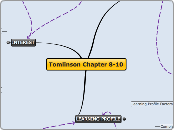Tomlinson Chapter 8-10
READINESS
The Equalizer
Foundational to Transformational
Concrete to Abstract
Opens A Door For Meaningful Abstraction
Simple to Complex
Single Facet to Multiple Facets
Small Leap to Great Leap
More Structured to More Open
Less Independence to Greater Independence
Slow to Quick
LEARNING PROFILE
Learning Profile Factors
Learning-style Preference
Intelligence Preference
Brain-based Predispositions for Learning
Culture-Influenced Preference
Gender-Based Preference
Combined Preference
Strategies
Complex Instruction
Entry Points
4-Mat
Varied Approaches to Organzing Ideas
INTEREST
Drawing on Existing Student Interest
Sidebar
Interest Centers or Groups
Specialty Teams
Expanding Student Interest
Real Life application
New Forms of Expression
See things in new light
Guidelines
Learning About an Interest Area
Scaffolding
Sharing Quads or Adults Who Have Similar Interest
Welcome Ideas and Show Interest
A greatest gift a teacher can give is permission to explore a topic, time to do it, and an interested ear (p. 58).
Combination of DI
Strategies
I-search
Orbitals
Design-A-Day
Group Investigation
WebQuests
Jigsaw
Literature Circles
Negotiated Criteria
